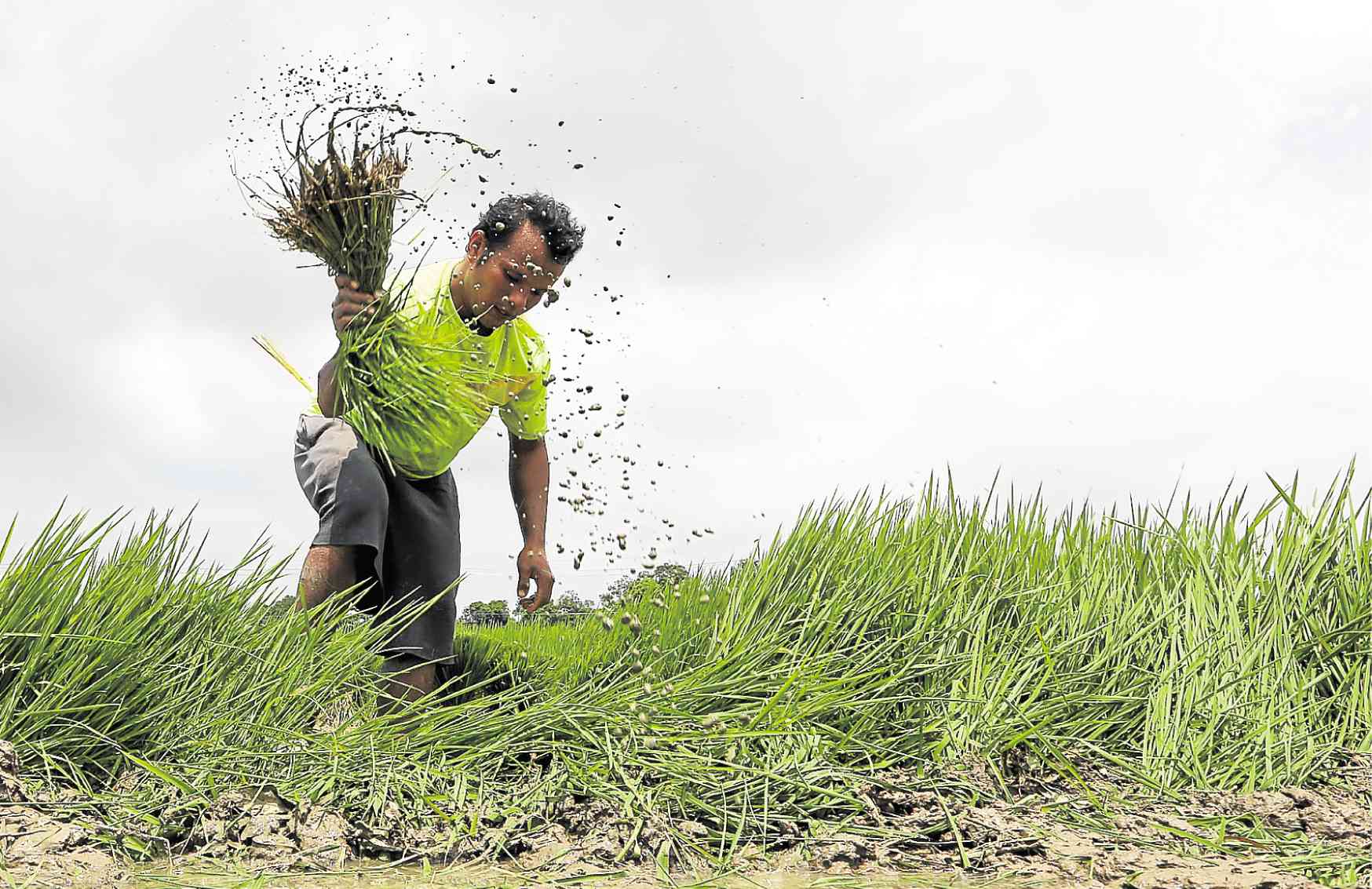
TOUGH WORK Rice cultivation is tough work as this farmer demonstrated during planting season in Bulacan province. —NIÑO JESUS ORBETA
Flooding the market with imported rice to stem inflation is likely to hurt Filipino rice farmers most as they prepared for the harvest season, militant lawmakers warned on Wednesday.
The Makabayan bloc at the House of Representatives said rice farmers were likely to suffer the same fate that befell tomato growers in Laguna province as a result of President Rodrigo Duterte’s order to remove restrictions on rice importation.
“We will be witnessing how the government will kill our local rice farmers while allowing rice cartels to rake in huge profits,” Anakpawis Rep. Ariel Casilao said at a news briefing.
Bayan Muna Rep. Carlos Zarate said the President issued the order while farmers were already busy preparing for the harvest season.
Oversupply
“Flooding the country with cheap imported rice might force our rice farmers to just dump their produce because nobody will buy it from them,” Zarate said.
“If that happens, they will be like the tomato farmers in Laguna who had to dump tons of tomatoes they harvested because of oversupply,” he said.
He was referring to a group of farmers at Kalayaan town in Laguna province who opted to throw away more than 10 tons of tomatoes as their produce had started to rot.
Farmers said they were previously selling tomatoes at P500 per 21 kilogram of tomatoes.
But oversupply, caused by imported tomatoes, prompted them to sell at P100 per box until vegetable traders refused to buy anymore.
Flood the market
On Tuesday, presidential spokesperson Harry Roque said the President, to fight inflation, had instructed the National Food Authority (NFA) to remove volume restrictions on rice imports.
“He wants to flood the market with rice,” Roque said.
He added that even if oil prices went up further “the people will have access to affordable rice.”
Zarate said during his visit to farming communities in northern Luzon, rice farmers were wondering if the NFA would buy their rice as it had promised.
“While the government is quick to import rice, it is very slow in buying rice from our local farmers,” Zarate said.
He reiterated a call for the NFA to buy rice from local farmers at P22 per kg.
The President’s order, however, could not take effect until approved by the NFA Council.
RICE CRISIS Militant farmers’ groups rally at the Department of Agriculture office in Quezon City on Sept. 5 to protest what they said were myopic solutions to rising prices. —GRIG C. MONTEGRANDE
Council guidelines
NFA Regional Director Gerry Imperial, at a Palace briefing on inflation, said the council would give “clear guidelines.”
Imperial said decisions by the council would be “harmonized” because its chair was Agriculture Secretary Emmanuel Piñol who was present when Mr. Duterte gave the order at a Cabinet meeting on Monday to remove restrictions on importing rice.
Mr. Duterte’s order to allow unbridled rice importation was based on a proposal made by Finance Secretary Carlos Dominguez III, who made a presentation at the Cabinet meeting on Monday showing that rising rice prices was a key factor in last month’s 6.7-percent inflation.
Rules in place
Roque had said liberalizing rice importation meant no accreditation was needed and the NFA would have no say on how much rice could be brought in.
Trade Undersecretary Ruth Castelo said, though, that although rice importation would be “hassle-free,” it was still covered by the NFA rules, which remained in place and “we still follow regulations.”
Castelo, a member of the NFA Council, said the Department of Trade and Industry had recommended that the NFA waive fees for rice importers.
She said consumers would feel the effects of unbridled importation in the coming weeks.